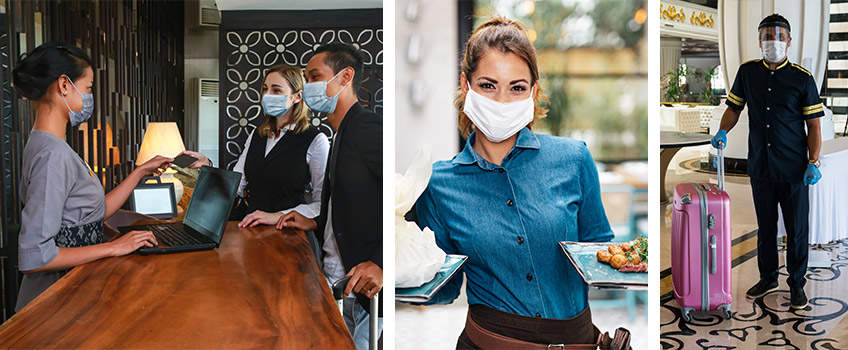COVID-19: The Hospitality Industry Adapts

Navigating Compliance Mandates, While Maintaining Consistent Guest Service
By Bob Ambrose, consultant, adjunct instructor, former Atlantic City casino executive
Adapting to a crisis is built into the core of the hospitality industry. Hospitality is about employees serving guests within an environment that is fluid, and in that environment "life" happens. My years in the hospitality industry (the bulk spent in Atlantic City) have taught me that things don’t always go according to plan!
The hospitality industry is operated within a formula of fundamental business applications to achieve an operational balance, themed in “dedication to guest service.” It is not defined by masked employees, speaking to guests from a distance and wiping everything the guest touches! The human interaction, the warm smile, friendly greeting and pleasant exchange is the industry's presentation.
The industry's numerous types of venues have been the public's “third place;” whether it's dining, entertainment, retail, lodging or gambling. In Ray Oldenburg’s 1989 book, The Great Good Place he expanded on this premise, defining the “third place” as places where people gather, putting aside their concerns of home and work to enjoy an experience.

Bob Ambrose
The COVID-19 virus has limited our access to many of our third places and struck at the markers that makes up our social core. We have lost the opportunity to sit at a café or dine with companions at a restaurant. Our travel has been restricted, leaving us with only memories of places we have been. We now conduct business, education and social time using our computer as a portal.
The Atlantic City hotel casino properties, along with the entire industry, did raise the bar offering a healthier footprint for employees and guests in this critical time. At the on-set of the pandemic, industry members found ways to adapt to new regulatory operational parameters and restrictions. It was at best, education on the run! Within hours of property shutdowns, plans were developed to improve the resorts operating floor models promoting distance and sanitization for all customer touch points. Investments were made into healthier air quality. Technology was about to play an increased role in service delivery from digital restaurant menus to a cashless casino floor.
The Atlantic City hospitality industry has seen decades of its complex infrastructure tested. With each economic downturn or business interruption its hospitality workforce has maintained a certain resilience. COVID-19 has impacted the industry with a major loss of jobs and benefits. The impact has spread throughout the industry supply chain to other business sectors and into the local community.
Reestablishing consumer confidence to visit venues will require operational transparency, employee education to promote customer awareness, and creative marketing programs.
As the industry continues to deal with the pandemic’s collateral damage to their various operations, experts are predicting a 12-24-month recovery at best. Many of the safety protocols and operational modifications to the industry’s infrastructure won’t stop when the pandemic ends.
Recovery for the industry will be a slow, coordinated effort. That means the state (regulators), city officials, industry suppliers and properties working together. The academic institutions' role will be paramount in terms of even more strategic research and focused employee/student educational programs to assist the industry in terms of best practice methods and solutions.
Reestablishing consumer confidence to visit venues will require operational transparency, employee education to promote customer awareness, and creative marketing programs. Although it has been said we are looking at a new normal ahead, we can also say it is an improved normal with upgraded service deliverables.
We will see the friendly smiles of hospitality employees again in our chosen “third place.”



